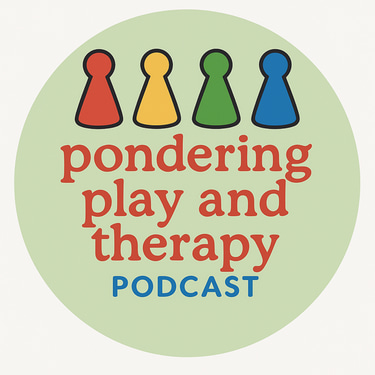Building Underdeveloped Sensorimotor Systems: An Interview with Sarah Lloyd
In this episode of the Pondering Play and Therapy podcast, Julie sat down with Sarah Lloyd — consultant occupational therapist, play therapist, and creator of the BUSS model (Building Underdeveloped Sensorimotor Systems). Speaking from what she fondly calls her “scruffy mill” in Leeds, Sarah shared her professional journey, her insights into the sensorimotor systems of children, and the hope she sees when underdeveloped systems are given the chance to grow.
Philippa, with the assistance of AI
9/19/20252 min read


The Roots of Play: Sarah’s Early Years
Growing up in rural Scotland, play for Sarah was full of freedom, risk, and imagination. Long days exploring castles on her bike, making up stories with friends, and inhabiting characters like Charlie’s Angels gave her a playful lens on the world that still shapes her today.
Even now, at 57, Sarah says she tries to “elevate the mundane into something playful” — whether that’s cutting the grass in new patterns or finding fun in everyday tasks.
From OT to Play Therapy: A Rich Journey
Sarah’s professional path began with occupational therapy in Glasgow, followed by psychoanalytic training, and eventually play therapy. Working in Child and Adolescent Mental Health Services (CAMHS) for decades gave her a wide perspective across teams and approaches.
But something kept surfacing: many of the children she worked with, especially those in foster or adoptive care, were struggling in ways that traditional therapy wasn’t fully addressing.
The Spark Behind the BUSS Model
It was in noticing her own young children’s typical development that Sarah began asking critical questions:
Why couldn’t some of the children she worked with carry a glass of water without spilling?
Why were so many bumping, crashing, or eating until they were sick?
Why were squints and coordination difficulties so common?
Her curiosity led her deeper into sensorimotor integration theory and eventually to develop the BUSS model.
What is BUSS?
BUSS (Building Underdeveloped Sensorimotor Systems) focuses on the foundation of bodily regulation. Sarah explains that before children can regulate emotions, learn, or engage in relationships, their bodies need:
Core strength and stability (head, neck, trunk, shoulders)
Gravitational security (feeling safe when moving)
A regulated tactile system (moving from defensive to discriminative touch)
Where early development has been disrupted — through premature birth, maternal stress, neglect, trauma, or absence of good-enough caregiving — these systems can remain underdeveloped.
The hopeful message? They are not damaged, but underdeveloped, and can be built through playful, relational, body-based activities.
Parents as Agents of Change
A cornerstone of BUSS is that parents and carers are the main agents of change, not therapists. Through playful, repeated activities (sometimes as short as two minutes, several times a day), parents can help their children strengthen these foundations.
Sarah emphasises:
It’s not about endless therapy sessions.
It’s about empowering families with playful, achievable tools.
Once foundations are rebuilt, children often rejoin the typical developmental trajectory.
Why It Matters for Play Therapists
As Julie reflected in the conversation, play therapy often meets children whose bodies are “swimming into the room.” Without bodily regulation, even the best therapeutic play can be difficult for them to access.
BUSS invites us to look beyond the psychological and relational, and to consider the body as the first home of regulation.
A Lens of Hope
Sarah’s approach offers enormous hope: underdeveloped sensorimotor systems are amenable to change. By weaving body, play, and relationship together, we can help children reclaim their potential.
As Sarah beautifully puts it:
“We are people who live in our bodies. Understanding the impact of disruption to bodily regulation — and supporting families to rebuild it — gives children the chance to thrive.”
Learn More
You can listen to the full conversation on the Pondering Play and Therapy podcast, and find out more about the BUSS model on the official website. https://bussmodel.org/
✨ Invitation
At Pondering Play and Therapy, we believe conversations grow stronger with community. Whether you’re a parent, carer, practitioner, or simply curious, we’d love to hear your reflections. Does this lens of bodily regulation resonate with your experiences?
